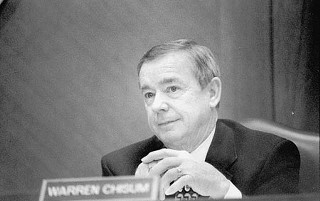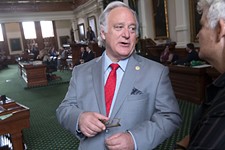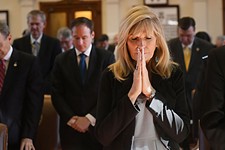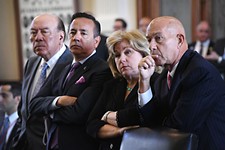On the Lege: Budget Rollout
The budget battle begins at the Capitol
By Amy Smith, Fri., March 30, 2007
The House today (Thursday) begins the gnarly process of debating a $150.1 billion spending plan designed to keep the state in functional order (relatively speaking) for the next two years. House members have filed more than 200 amendments they hope to tack on to House Bill 1, carried this year by Appropriations Chair Warren Chisum. The veteran rep is serving his first term leading the budget charge, making the affable elfin Republican from the Panhandle the second most powerful leader in the House. Early this week, Chisum was already certain of one thing – that lawmakers filed only some 200 amendments – down from about 500 in 2005 – meaning he won't have to break as many hearts in the killing process.
At first glance, the spending proposal looks to be everything the budget writers say it is – a fine specimen of a budget that will add more money for education, beef up border security, shore up health and human services and the hobbled parks system, and put Texas on the road to a cleaner, brighter future (see box). But ask the direct stakeholders in each of those funding areas what they think of the budget, and some variation of the word "disappointed" is bound to crop up again and again.
Rest assured the Democrats are with them on that one. The budget ruckus got an early start last week, with the adoption of a rule aimed at preventing Dems from putting more money into traditionally underfunded areas such as education and health care. Simply put, the spending can't exceed $150.1 billion, so if more money is slipped into one program, the dollars have to be siphoned out of another program. The same rule has applied in past sessions, but economic times were harder then. With the state a little more flush with cash, Democrats argue, now would be a good time to prop up schools and social services.
The budget leaders have other plans, which include leaving $8.5 billion unallocated, about half of which will get tucked into the Rainy Day Fund. If the less-government people have their way, and if the Republican leadership follows through on a campaign promise, homeowners could see another property-tax cut in 2009. The House has already passed a spending bill to pay for the $14.2 billion in tax cuts that lawmakers approved last year as an answer to fixing the school finance crisis.
Of course, it wasn't really a "fix" but a short-term solution to meeting a court deadline. Educators and their advocates are sharply critical of the $2.4 billion plan for funding public ed from kindergarten through 12th grade. While it may be a nearly 9% increase in dollars, a good chunk of the additional money is for enrollment growth.
Rep. Lois Kolkhorst, R-Brenham, who chairs an Appropriations subcommittee on education, cautioned that it's too soon to cast stones on a work that's still in progress. And she's pleased with how it's shaping up. "So far, it's the strongest budget I've seen in years in terms of education funding," she said. "Of course, there's always room for improvement."
On that score, education advocates – the ones who rally for respectable funding – are not terribly optimistic that lawmakers will free up more money for the cause. Ted Melina Raab, a lobbyist for the Texas Federation of Teachers, said there would be $600 million readily available – if lawmakers would just end their fixation with "performance incentive" bonuses. But the leadership's preference is to leave the incentive-pay program – and the nearly $600 million to fund it – just the way it is.
All in all, Raab says, the school-budget proposal doesn't measure up to the education promises that legislators made on the 2006 campaign trail. "The various funding decisions the Legislature has already made [the $14.2 billion in property tax cuts, for example] reflect a lack of attention to education as the high priority that most Texans understand that it is," he said. Also, the campaign rhetoric about across-the-board teacher pay increases, and the restoration of a previously axed $1,000 health-care stipend didn't materialize either, he noted. "Teachers in Texas remain at levels of pay that are not sufficient to compete with jobs in the private sector," he said.
There is one bright spot, though. The state contribution rate to the Teacher Retirement System pension fund will jump to 6.7%, up from the current 6%. But Raab says his group isn't completely satisfied with the mathematical equation used to give the pension fund a boost. "There are several ways a benefit can be delivered to retirees," Raab said, "and this is probably the least preferable." A more favorable method would allow for cost of living adjustments every two years, instead of this proposed one-time shot in the arm. Still, teachers aren't inclined to complain too loudly because something is better than nothing, as they say, and, more importantly, the Senate doesn't share the House's enthusiasm for a pension fund increase.
From another perspective, the budget offers little financial support to help educators and students meet increased performance mandates. As a result, students end up ill-prepared for college and the job market, according to John Stevens, executive director of the Texas Business and Education Coalition, a public-education-friendly group. "We need to deal with the real world," he said. "We can't just raise the standards and squeeze the system and say, 'perform!'"
At a Glance
Of the overall $150.1 billion budget, here's a look at what's been proposed for some of the state's high-profile programs:
Public education – $2.4 billion, including $50 million for new high school improvement and dropout-reduction program.
Higher education – $925.9 million (don't expect to see reduced tuition rates), including $47 million for graduate medical education programs.
Children's Health Insurance – $205.5 million to fund CHIP caseload growth.
Homeland security – $101 million, including additional DPS troopers along the border.
Texas Youth Commission – Zero funding increases, pending "legislative direction" on the agency.
Environment – Slim pickings. $1 million to reduce diesel-exhaust emissions on school buses; $15 million for coastal erosion grants, and $38.9 million for parks.
Got something to say on the subject? Send a letter to the editor.











